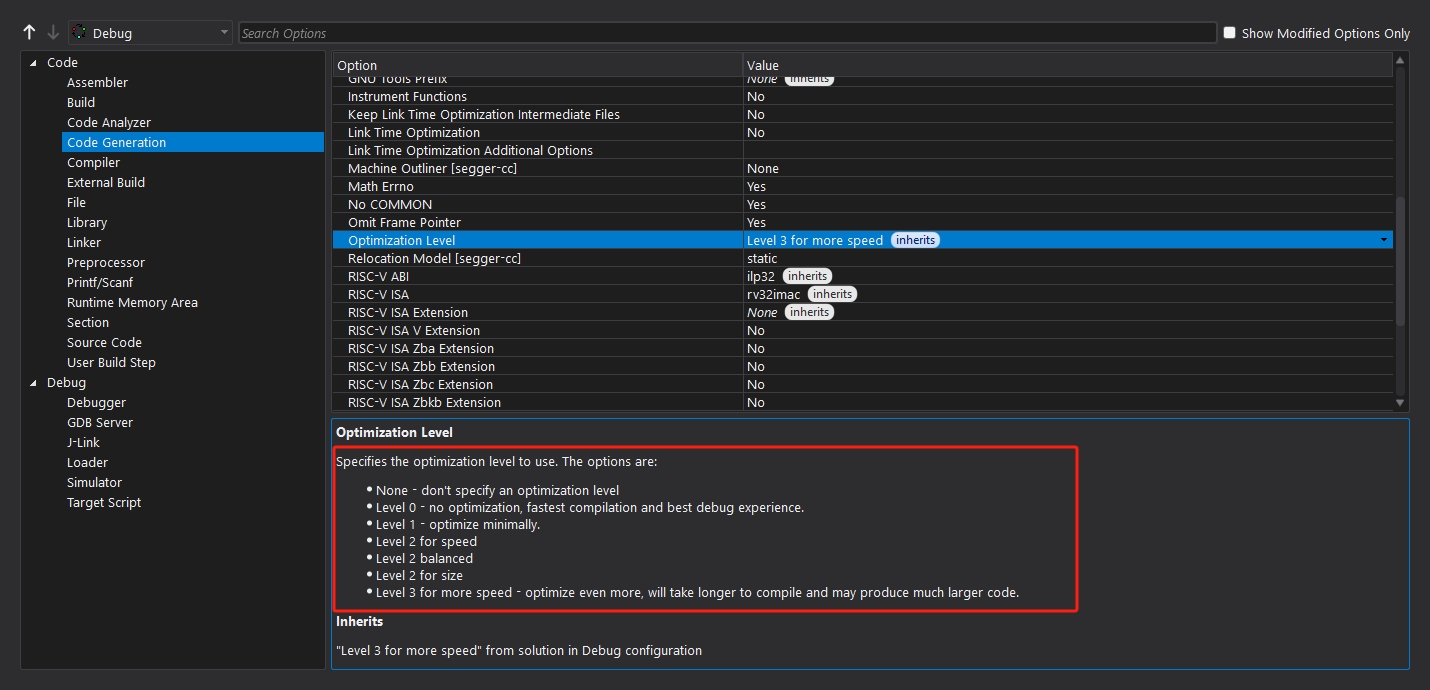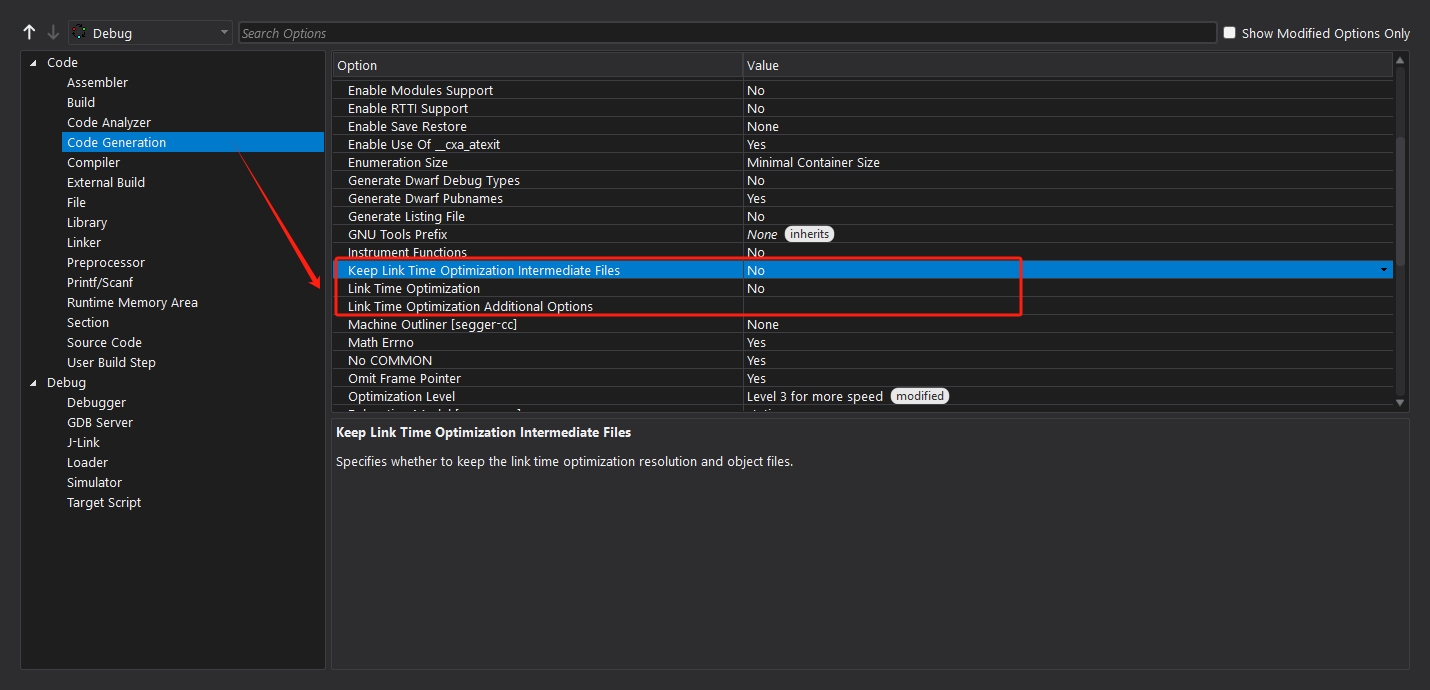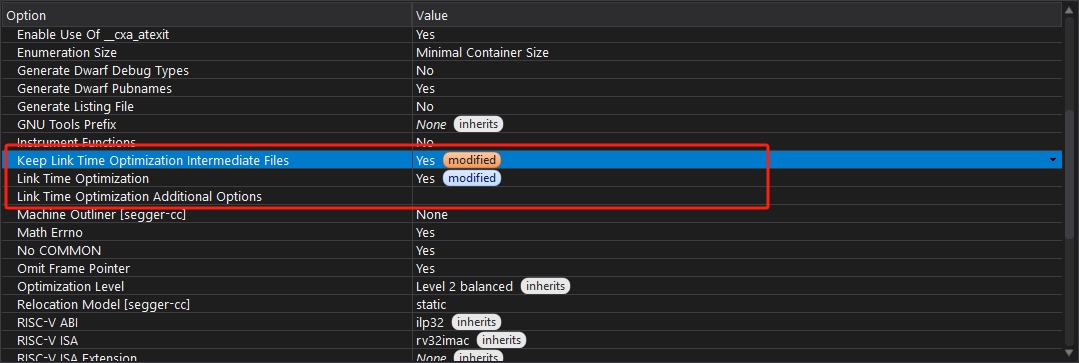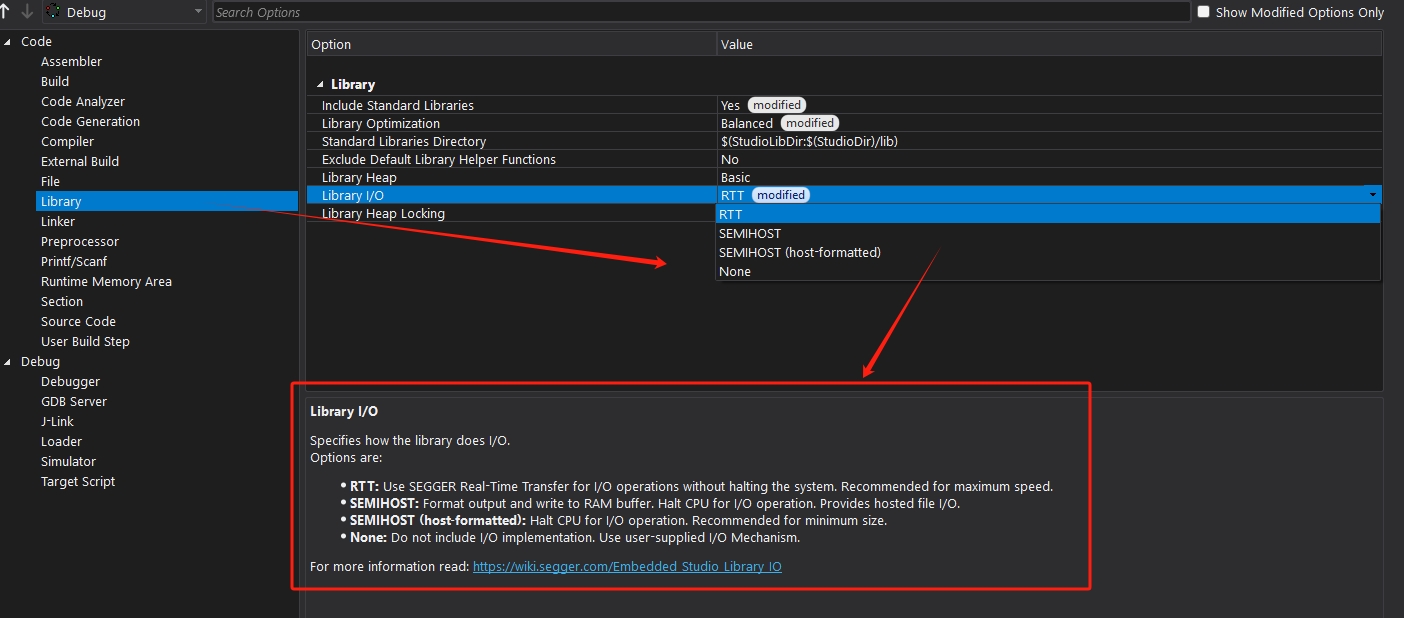SEGGER Embedded Studio for RISC-V 代码优化等级与 LTO 优化等级 配置说明

上面只是对局部代码进行优化。由于编译器一次只编译优化一个编译单元,所以只是在做局部优化,而利用 LTO,利用链接时的全局视角进行操作,从而得到能够进行更加极致的优化。开启LTO优化部分,位置:

1、LTO定义
“Link-Time Optimization.” Any kind of optimization that requires looking at the whole program, LLVM features powerful intermodular optimizations which can be used at link time.
LTO(Link-Time Optimization) 就是对整个程序代码进行的一种优化,是 LLVM 里在链接时进行跨模块间的优化。
LTO 属于 IPO(interprocedural optimization) 当中的一种优化,根据维基百科的解释,IPO 是优化代码的一系列编译器优化技术的集合,不同于其他的优化技术,IPO 聚焦于分析整个程序代码。
2、LTO主要优化
跨模块优化的效果,也即开启LTO主要有这几点好处:
(1)将一些函数內联化
(2)去除了一些无用代码
(3)对程序有全局的优化作用
PGO(Profile Guided Optimization) 对于进行 LTO 优化也很有帮助。
3、LTO 的问题
开启 lto 后导致产生的 linkmap 可读性变差,如文件名信息可能会变成 8.arm64.thinlto.o 这样的数字,可以对 libLTO.dylib 的行为进行修改,使用 -lto_library 让链接器使用我们指定的 dylib 库。
比较体验不好的是,LTO 会导致编译和链接变慢,以及会使用更多的内存,所以即使到现在,也没有看到 LTO 被广泛地使用。
SEGGER 官网介绍:Link Time Optimization (segger.cn)
开启 LTO 优化等级后配置如下:

这里按照SEGGER 官方说法:https://wiki.segger.com/Link_Time_Optimization
开启这个功能要实现几个函数 :
__SEGGER_RTL_X_file_bufsize,
__SEGGER_RTL_X_file_stat,
__SEGGER_RTL_X_file_write,
stdout
具体实现方法参考链接:https://wiki.segger.com/Embedded_Studio_Library_IO
/********************************************************************* * (c) SEGGER Microcontroller GmbH * * The Embedded Experts * * www.segger.com * ********************************************************************** -------------------------- END-OF-HEADER ----------------------------- Purpose : Implementation of low-level functions for I/O with the SEGGER Runtime Library using a UART (SEGGER's BSP UART module) */ /********************************************************************* * * #include section * ********************************************************************** */ #include "__SEGGER_RTL_Int.h" #include "stdio.h" #include "BSP_UART.h" /********************************************************************* * * Prototypes * ********************************************************************** */ void RTL_UART_Init(unsigned int Unit, unsigned long Baudrate, unsigned char NumDataBits, unsigned char Parity, unsigned char NumStopBits); /********************************************************************* * * Local types * ********************************************************************** */ struct __SEGGER_RTL_FILE_impl { // NOTE: Provides implementation for FILE int stub; // only needed so impl has size != 0. }; /********************************************************************* * * Static data * ********************************************************************** */ static FILE __SEGGER_RTL_stdin_file = { 0 }; // stdin reads from UART static FILE __SEGGER_RTL_stdout_file = { 0 }; // stdout writes to UART static FILE __SEGGER_RTL_stderr_file = { 0 }; // stderr writes to UART static unsigned int _UART_Port = 0; static int _stdin_ungot = EOF; /********************************************************************* * * Public data * ********************************************************************** */ FILE *stdin = &__SEGGER_RTL_stdin_file; // NOTE: Provide implementation of stdin for RTL. FILE *stdout = &__SEGGER_RTL_stdout_file; // NOTE: Provide implementation of stdout for RTL. FILE *stderr = &__SEGGER_RTL_stderr_file; // NOTE: Provide implementation of stderr for RTL. /********************************************************************* * * Static code * ********************************************************************** */ /********************************************************************* * * _stdin_getc() * * Function description * Get character from standard input. * * Return value * Character received. * * Additional information * This function never fails to deliver a character. */ static char _stdin_getc(void) { unsigned char c; if (_stdin_ungot != EOF) { c = _stdin_ungot; _stdin_ungot = EOF; } else { BSP_UART_ReadBlocking(_UART_Port, &c, sizeof(c)); } return c; } /********************************************************************* * * Public code * ********************************************************************** */ /********************************************************************* * * RTL_UART_Init() * * Function description * Initialize RTL to use given UART for stdio. * * Parameters * Unit : UART unit number (typically zero-based). * Baudrate : Baud rate to configure [Hz]. * NumDataBits: Number of data bits to use. * Parity : One of the following values: * * BSP_UART_PARITY_NONE * * BSP_UART_PARITY_ODD * * BSP_UART_PARITY_EVEN * NumStopBits: Number of stop bits to use. * * Additional description * Parameters are same as for BSP_UART_Init(). * This also sets appropriate RX and TX interrupt handlers. */ void RTL_UART_Init(unsigned int Unit, unsigned long Baudrate, unsigned char NumDataBits, unsigned char Parity, unsigned char NumStopBits) { _UART_Port = Unit; BSP_UART_Init(_UART_Port, Baudrate, NumDataBits, Parity, NumStopBits); } /********************************************************************* * * __SEGGER_RTL_X_file_stat() * * Function description * Get file status. * * Parameters * stream - Pointer to file. * * Additional information * Low-overhead test to determine if stream is valid. If stream * is a valid pointer and the stream is open, this function must * succeed. If stream is a valid pointer and the stream is closed, * this function must fail. * * The implementation may optionally determine whether stream is * a valid pointer: this may not always be possible and is not * required, but may assist debugging when clients provide wild * pointers. * * Return value * < 0 - Failure, stream is not a valid file. * >= 0 - Success, stream is a valid file. */ int __SEGGER_RTL_X_file_stat(FILE *stream) { if (stream == stdin || stream == stdout || stream == stderr) { return 0; // NOTE: stdin, stdout, and stderr are assumed to be valid. } else { return EOF; } } /********************************************************************* * * __SEGGER_RTL_X_file_bufsize() * * Function description * Get stream buffer size. * * Parameters * stream - Pointer to file. * * Additional information * Returns the number of characters to use for buffered I/O on * the file stream. The I/O buffer is allocated on the stack * for the duration of the I/O call, therefore this value should * not be set arbitrarily large. * * For unbuffered I/O, return 1. * * Return value * Nonzero number of characters to use for buffered I/O; for * unbuffered I/O, return 1. */ int __SEGGER_RTL_X_file_bufsize(FILE *stream) { (void)stream; return 1; } /********************************************************************* * * __SEGGER_RTL_X_file_read() * * Function description * Read data from file. * * Parameters * stream - Pointer to file to read from. * s - Pointer to object that receives the input. * len - Number of characters to read from file. * * Return value * >= 0 - Success, amount of data read. * < 0 - Failure. * * Additional information * Reading from any stream other than stdin results in an error. */ int __SEGGER_RTL_X_file_read(FILE *stream, char *s, unsigned len) { int c; if (stream == stdin) { c = 0; while (len > 0) { *s = _stdin_getc(); ++s; ++c; --len; } } else { c = EOF; } return c; } /********************************************************************* * * __SEGGER_RTL_X_file_write() * * Function description * Write data to file. * * Parameters * stream - Pointer to file to write to. * s - Pointer to object to write to file. * len - Number of characters to write to the file. * * Return value * >= 0 - Success. * < 0 - Failure. * * Additional information * this version is NOT reentrant! * stdout and stderr are directed to UART; * writing to any stream other than stdout or stderr results in an error */ int __SEGGER_RTL_X_file_write(FILE *stream, const char *s, unsigned len) { if ((stream == stdout) || (stream == stderr)) { BSP_UART_WriteBlocking(_UART_Port, (const unsigned char*) s, len); return len; } else { return EOF; } } /********************************************************************* * * __SEGGER_RTL_X_file_unget() * * Function description * Push character back to stream. * * Parameters * stream - Pointer to file to push back to. * c - Character to push back. * * Return value * >= 0 - Success. * < 0 - Failure. * * Additional information * Push-back is only supported for standard input, and * only a single-character pushback buffer is implemented. */ int __SEGGER_RTL_X_file_unget(FILE *stream, int c) { if (stream == stdin) { if (c != EOF && _stdin_ungot == EOF) { _stdin_ungot = c; } else { c = EOF; } } else { c = EOF; } return c; } /*************************** End of file ****************************/
注意这里 Library IO 库需要使用RTT的,否则编译会报错,配置位置:

本文来自博客园,作者:求隐,转载请注明原文链接:https://www.cnblogs.com/duguqiuying/articles/17919947.html



 浙公网安备 33010602011771号
浙公网安备 33010602011771号